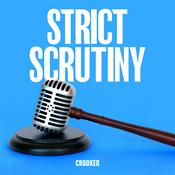Amicus With Dahlia Lithwick | Law, justice, and the courts
Slate Podcasts
Latest episode
652 episodes
- President Trump REALLY wants to invoke the Insurrection Act. He’s fallen hard for this 200-year-old law that would allow him to deploy active duty military to enforce civilian law on American streets. On this week’s Amicus podcast, co-host Mark Joseph Stern is joined by Professor Steve Vladeck, a nationally recognized expert on the Supreme Court, federal courts, national security law, and military justice. They discuss what’s been stopping Trump from invoking the act so far, why he has no legal authority to do so right now, and what happens if he does it anyway.
Next, Mark talks to Julia Gegenheimer, former special litigation counsel in the Justice Department’s Civil Rights Division’s Criminal Section, and now a special litigation counsel at Georgetown Law’s Institute for Constitutional Advocacy and Protection. Julia and Mark discuss the remaining paths to justice after the killing of Renee Good and examine what happens when the DOJ abandons its duty to seek accountability and vindicate civil rights.
Want more Amicus? Join Slate Plus to unlock weekly bonus episodes with exclusive legal analysis. Plus, you’ll access ad-free listening across all your favorite Slate podcasts. You can subscribe directly from the Amicus show page on Apple Podcasts and Spotify. Or, visit slate.com/amicusplus to get access wherever you listen.
Hosted on Acast. See acast.com/privacy for more information. - You saw it. We all saw it. We all saw what happened in Minneapolis when an ICE agent shot and killed Renee Good for the crime of being in her car. This week on Amicus, Dahlia Lithwick and Mark Joseph Stern attempt to digest this week’s horrific events and wonder if there is even a possibility of justice. Dahlia recommends “They Didn’t Even Need A Deepfake” by Slate’s Molly Olmstead.
Later in the show, Mark speaks with Brian Finucane, a senior advisor to the International Crisis Group. He spent a decade in the U.S. State Department’s Office of the Legal Adviser. Brian and Mark discuss the lawlessness of Trump’s foreign policy (cough cough, Venezuela), and how the administration’s approach embraces some of the worst aspects of tough-guy masculinity.
Want more Amicus? Join Slate Plus to unlock weekly bonus episodes with exclusive legal analysis. Plus, you’ll access ad-free listening across all your favorite Slate podcasts. You can subscribe directly from the Amicus show page on Apple Podcasts and Spotify. Or, visit slate.com/amicusplus to get access wherever you listen.
Hosted on Acast. See acast.com/privacy for more information. - In a special new year retrospective, Amicus host Dahlia Lithwick revisits an important episode from early 2025. Back at the beginning of February, Kim Lane Scheppele, the Laurance S. Rockefeller Professor of Sociology and International affairs at Princeton University, pointed to the speed and viciousness of the very opening legal gambits in Trump 2.0 as evidence that America had already switched over to the fast track for autocracy on January 20th, 2025. An expert in the law of autocracy, Scheppele has seen firsthand what happened to constitutional courts, the media, the academy and the democratic norms that protected them in Russia and Hungary. In this interview, Scheppelle explains how Trump’s executive orders on everything from government funding to transgender people in the military reveal a familiar global playbook that has chillingly familiar endpoints.
Want more Amicus? Join Slate Plus to unlock weekly bonus episodes with exclusive legal analysis. Plus, you’ll access ad-free listening across all your favorite Slate podcasts. You can subscribe directly from the Amicus show page on Apple Podcasts and Spotify. Or, visit slate.com/amicusplus to get access wherever you listen.
Hosted on Acast. See acast.com/privacy for more information. - Over the past calendar year, the Supreme Court’s center has shifted to the right and then more to the right, and the justices’ decisions have time and again facilitated Trump’s agenda. But the Roberts majority is not simply focused on what the current president wants; it has its sights set on a larger project: voting. Suppressing and constraining and problematizing the core function of democratic rule. In this episode, Dahlia Lithwick and Mark Joseph Stern reflect on the significant developments at the Supreme Court over the past year with an eye toward the implications of the court's decisions on democracy, voting rights, and the erosion of checks and balances. Looking back at the past year at One First Street, Dahlia and Mark trace the cases that reveal the court’s long game, with elections coming quickly, and discuss the forces for and against democracy being exerted within and without the high court. Then, they turn to the urgent matter of what you and I can do about it.
If you want to access that special 50% discount for Slate Plus membership, go to slate.com/amicusplus and enter promo code AMICUS 50. This offer expires on Dec 31st 2025.
Hosted on Acast. See acast.com/privacy for more information. - In mid-March of 2025, ACLU attorney Lee Gelernt and his colleagues started hearing that the Trump administration might attempt a flagrantly lawless publicity stunt, involving migrant men, secret flights to El Salvador, a notorious gulag, and a total disregard for due process. Despite getting word that something was about to happen, and rushing into a Saturday night hearing, and then securing a TRO from DC judge James Boasberg, Lee and his colleagues were unable to prevent more than 250 men from being renditioned from Texas to the CECOT torture prison in El Salvador. The legal cases spawned by the dramatic events of March 15th 2025 haven’t gone away, indeed they are reaching crucial milestones in the courts, raising foundational questions about the abuse of statutes and what it means to defy court orders. On this week’s Amicus, Dahlia Lithwick is joined by the ACLU’s Lee Gelernt who is litigating these cases, to discuss the very high stakes of a set of cases that may have fallen off your radar in the shuffle.
How these cases play out will dictate much of what happens for the rest of Trump’s term in office by answering democracy-defining questions such as whether the antiquated and radical wartime powers of the Alien Enemies Act can be unleashed on people the government deems enemies domestically, whether court orders are actually directives the Trump DoJ is bound to follow, whether the district courts can require Pam Bondi’s justice department to assist in the finding of fact, and whether the ancient legal concepts protecting liberty of due process and habeas corpus have the force of law in Trump’s America.
If you want to access that special 50% promotion for Slate Plus membership, go to slate.com/amicusplus and enter promo code AMICUS 50. This offer expires on Dec 31st 2025.
Hosted on Acast. See acast.com/privacy for more information.
More Government podcasts
Trending Government podcasts
About Amicus With Dahlia Lithwick | Law, justice, and the courts
A show about the law and the nine Supreme Court justices who interpret it for the rest of America.Want more Amicus? Join Slate Plus to unlock weekly bonus episodes with exclusive legal analysis. Plus, you’ll access ad-free listening across all your favorite Slate podcasts. You can subscribe directly from the Amicus show page on Apple Podcasts and Spotify. Or, visit slate.com/amicusplus to get access wherever you listen. Hosted on Acast. See acast.com/privacy for more information.
Podcast websiteListen to Amicus With Dahlia Lithwick | Law, justice, and the courts, Into Africa and many other podcasts from around the world with the radio.net app
Get the free radio.net app
- Stations and podcasts to bookmark
- Stream via Wi-Fi or Bluetooth
- Supports Carplay & Android Auto
- Many other app features
Get the free radio.net app
- Stations and podcasts to bookmark
- Stream via Wi-Fi or Bluetooth
- Supports Carplay & Android Auto
- Many other app features

Amicus With Dahlia Lithwick | Law, justice, and the courts
Scan code,
download the app,
start listening.
download the app,
start listening.























